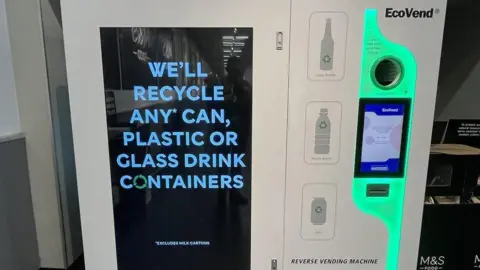Phil SimScotland political correspondent
 PA Media
PA Media
Lorna Slater said she had expected problems to be resolved, because the whole of the UK was moving to set up similar schemes
Lorna Slater has told a court the Scottish government had no reason to expect UK ministers to block Holyrood’s deposit return recycling scheme.
The project collapsed in 2023 after a row over internal market rules, leading waste firm Biffa to sue for £50m in damages.
The firm said Slater should have been up front about the risk posed by those rules when telling them of the government’s unwavering commitment to the project.
But she told the Court of Session she had expected problems to be resolved, because the whole of the UK was moving to set up similar schemes.
Biffa initially claimed for more than £166m, including lost profits from a 10-year contract, but is now seeking £51.4m for the money it invested in infrastructure for the scheme.
Biffa has said a letter from then minister Slater in May 2022 was “foundational” in its decision to sign a contract and ultimately invest tens of millions in infrastructure.
The letter stated the government’s “unwavering” commitment to launching the scheme on schedule in August 2023, and the firm said it was “akin to a guarantee”.
Slater told the court her letter to Biffa was not a project update, but that she had been asked to address specific points including the government’s commitment to it – having recently delayed it by a year.
She said she had invited the firm to ask any questions, and that they could have come back to ask about risks.
She also said internal market rules were only one of a number of potentially existential risks to the scheme, but that the government was committed to working through them.
Slater said the fact that the governments had recently agreed an internal markets deal for a ban on single-use plastics had shown that the process could be worked through, and that she did not think of it as an application which could be accepted or rejected.
She said: “There was no reason at all to expect the UK government to block the scheme. In fact it was in their interest to back it as a sort of pilot scheme so lessons could be learned for the rest of the UK.
“It wouldn’t make the slightest bit of sense to hinder Scotland’s DRS (deposit return scheme) when all nations of the UK were moving in the same direction.”
Lorna Slater is due to continue her evidence on Tuesday.
 PA Media
PA Media
Alister Jack told the court there was not a “viable scheme” until the point an exclusion to internal market rules had been granted
Former Scottish Secretary Alister Jack earlier told the court that the Scottish government was “utterly irresponsible” in encouraging firms to invest in its deposit return scheme.
He said it had been clear to Scottish ministers for some time that the scheme would need an exclusion from the Internal Market Act, but they did not make a formal application until 2023.
Lord Jack said writing to firms in 2022 voicing confidence in the scheme without mentioning risks was “akin to building a house and then asking for planning permission”.
The Scottish government has always insisted it was not to blame for the collapse of the plans and that it followed the proper processes around internal market rules.
But Lord Jack told the court there was not a “viable scheme” until the point an exclusion to internal market rules had been granted.
“The letter may have been true in what it said but it was missing an awful lot of material facts that I think, as a politician and a businessman, were commercially sensitive in decision-making,” he said.
“Irrespective of the process being followed, for me it was irresponsible not to tell companies that are spending money what the risks are, and there was no mention of risk. There was a huge level of risk and it was utterly irresponsible to send that letter.”

The scheme would have seen “reverse vending machines” set up to process returns
The Scottish government has sought to play down the significance of the letter, and says the firm understood there were risks.
It points to the fact Biffa had taken out a £20m insurance policy against any delay.
Both then first minister Humza Yousaf and Slater accused Lord Jack of “sabotaging” the scheme when it collapsed in 2023.
Lord Jack said the Scottish government should have asked for an exclusion from the Internal Market Act a year earlier when it was clear it was needed.
“I can’t understand why they made such a hash of it,” he said.
“The first minister had written letters, the minister for circular economy too, encouraging stakeholders to make financial commitments when they didn’t have a viable scheme.
“Divergence was very clear from a very early stage. My responsibility was to protect free trade, consumers and business who were very concerned about this in relation to the economy.”
Lord Jack said he was worried about “massive inflation” – more than 1,000 firms had written to him to voice concerns
“I wanted answers to these questions that were going to hit the economy, hit consumers and hit the least well off,” he said.


